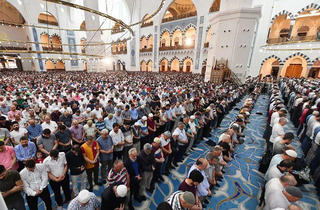Eid al-Fitr festivities commenced with dawn prayers at mosques in various cities and towns worldwide. These prayers hold deep spiritual significance for Muslims, symbolizing gratitude and renewal.
Additionally, special prayers were offered for fellow Muslims enduring hardship in regions such as Palestine, Indian Occupied Kashmir, and Turkistan, where oppression persists.
Eid al-Fitr translates to "Festival of Breaking the Fast," and it truly embodies the spirit of joy and togetherness. Families reunite for grand feasts, often featuring elaborate sweet dishes prepared especially for the occasion.
The air thrums with excitement as children receive gifts and don new clothes, a tradition symbolizing a fresh start. Warm greetings of "Eid Mubarak" ("Blessed Eid") fill the streets as friends and relatives come together to celebrate and strengthen their bonds.
The emphasis on forgiveness and reconciliation is another hallmark of Eid al-Fitr. Muslims are encouraged to mend any broken ties and seek peace with one another. Homes are decorated with vibrant colors and festive lights, reflecting the joyous mood that permeates the celebrations.
In countries with large Muslim populations, Eid al-Fitr translates into a much-anticipated public holiday. Schools and businesses close their doors, allowing families ample time for cherished traditions and heartfelt gatherings. This festive spirit extends beyond Muslim communities, with many countries recognizing Eid al-Fitr as a national holiday, fostering a sense of inclusivity and respect for diverse traditions.
Eid al-Fitr serves as a powerful testament to the global Muslim community's shared faith and traditions. It's a time for reflection, gratitude, and most importantly, celebration. As festivities unfold across the globe, the spirit of Eid al-Fitr brings a message of hope, peace, and unity. (ILKHA)



 Dünya
Dünya
 Güncel
Güncel
 Güncel
Güncel
 Güncel
Güncel
 Güncel
Güncel
 Dünya
Dünya
 Güncel
Güncel
 Güncel
Güncel
 Sağlık
Sağlık
 Güncel
Güncel





